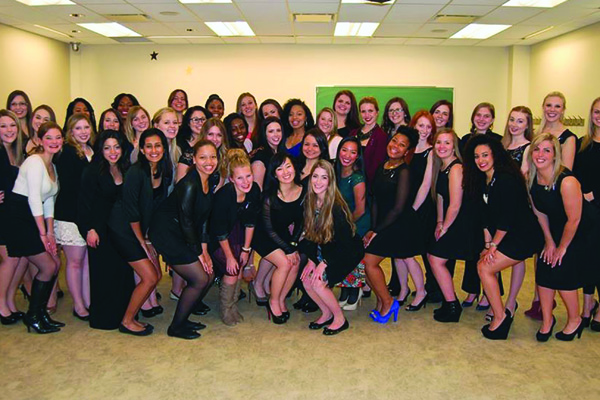Should you be honest when you reject someone?
Keep it honest, but short
Sabrina Nemis | Fulcrum Staff
Don’t be a jerk
I used to be kind of an asshole. I once dated someone for four months and then just stopped answering his phone calls and crossed the street when I saw him coming. I ended a fling by openly dating a person he hated without actually ending it first. I threw a birthday party for someone who had confessed his affection for me so I could date his best friend. I avoided directly rejecting anyone who showed interest in me that I didn’t reciprocate.
There’s nothing like a bit of karma to change your perspective, and since the days when I would treat other people like garbage, I’ve been on the receiving end of some truly awful dating behaviour.
Be direct
I’ve come to believe whole-heartedly that rejection sucks just as much for the person giving it as the person receiving it. That’s why so many people avoid doing it properly and why so many people are terrible at it.
The best kind of rejection—whether you’ve been dating for four months or someone has asked you out for the first time—is a direct, “No, thank you, I’m not interested.”
It sounds simple and you’d think anyone can do this, but it’s one of the hardest things to say to another person. It’s flattering when someone likes you and I think there’s a fear that when you reject a person, they’ll hate you. It’s especially hard if you like the person in a platonic way and you’d like to stay friends with them.
But the more you drag it out, the more that person is going to seem a bit pathetic and sad. When they finally do figure it out, they are going to feel pathetic and sad, as well as embarrassed and probably angry with you for not saying something sooner.
If a person has been direct in telling you they like you, they deserve a direct answer in response. No one feels awesome being rejected, but you can spare this person the awkwardness of being strung along.
Explanations are unnecessary
You can also spare them the awkwardness of explanations. If you don’t want to be with someone, it’s not going to matter if they become vegetarian, dye their hair red, or start listening to punk rock. Don’t let them imagine some impossible future where you’ll change your mind if you aren’t going to.
The whole thing is about respect. Treating someone as though being rejected by you is going to destroy their world is disrespectful and ridiculous. You are not the most incredible human bring in the universe and this person will most definitely get over you. They’ll get over you a lot faster if you’re honest about how you feel, and you’ll feel a lot better about yourself if you don’t act like an asshole.
Let social cues and clichés do the work
Jesse Colautti | Fulcrum Staff
“Sometimes the truth isn’t good enough. Sometimes people deserve more.” When it comes to rejection, Batman has never said truer words.
Honesty is one of the most admirable qualities found in human beings, but a rejection can’t be looked at as an isolated test of your character. There are many factors to consider, and particular situations sometimes call for a gentler touch than the truth can offer.
The early dating let down
At a bar or on the dance floor, the best way to reject somebody is as bluntly as possible—no argument there. But let’s say you thought you were interested in somebody, and you go out on a few dates and sparks don’t fly. Isn’t it better to let that person down gracefully?
Less harm will result from blaming your disinterest on a busy schedule or recent tough break-up rather than an honest dismissal of someone when you finally take a closer look at his or her personality.
Before you dismiss me, think about the last time you were in this situation. Did you really give that person the full truth? Did you tell him his smell turned you off, how you were tired of listening to her without being given a chance to speak, that he was conceited, or that she wouldn’t shut up about her ex?
No, you massaged the truth. You eased him or her into it, or let the silence of your phone do all the talking. And that’s not wrong or immoral—it’s simply using social cues and hints to make a difficult message a little easier to take.
The break-up
If you’re truly finished with a relationship, ending it in the least confrontational way is in each party’s best interest. I’m not saying avoid text messages, or his or her physical presence—those tactics are best left for early date rejections—but when the news is going to hurt that person anyway, it’s best to say something that won’t make the pain worse.
If you cheated on someone, tell the truth. But if you simply are interested in someone else, the best thing you can do is keep that information as far away as humanly possible from your soon-to-be ex. The relationship is going to end regardless, so the focus should be on getting through the break-up with the least amount of hurt feelings possible. What does it matter if the other party thinks you broke up because you wanted to be alone for a while, rather than because you had feelings for someone else?
Think about the consequences
While we like to think we are mature enough to take rejection well, in most cases it will alter our future behaviour around someone. Ending things amicably should be your priority because you never know when you might see that person again. Somebody you just rejected might be a co-worker down the road, or might be stuck in your classes for the next three years.
It’s amazing how much awkwardness and embarrassment can be avoided by simply pretending you never received that late-night booty call from a friend. After all, there isn’t really a way to go back to being friends after you let someone know, “I just don’t think the sex would be very good.”







